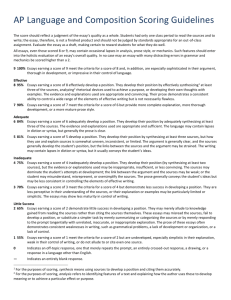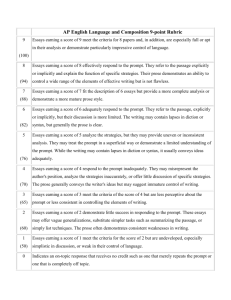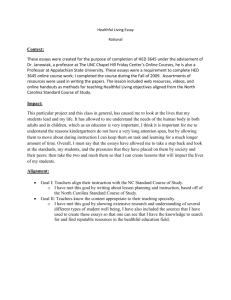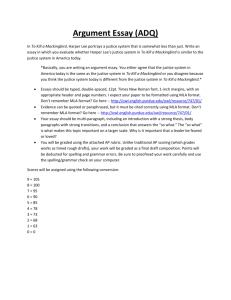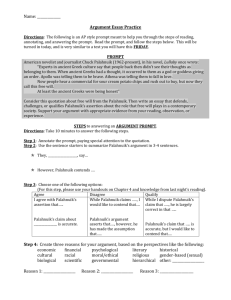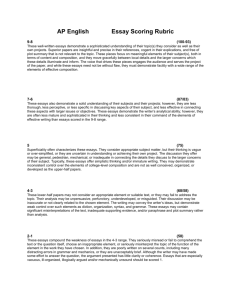AP LANGUAGE AND COMPOSITION – GRADING RUBRIC
advertisement
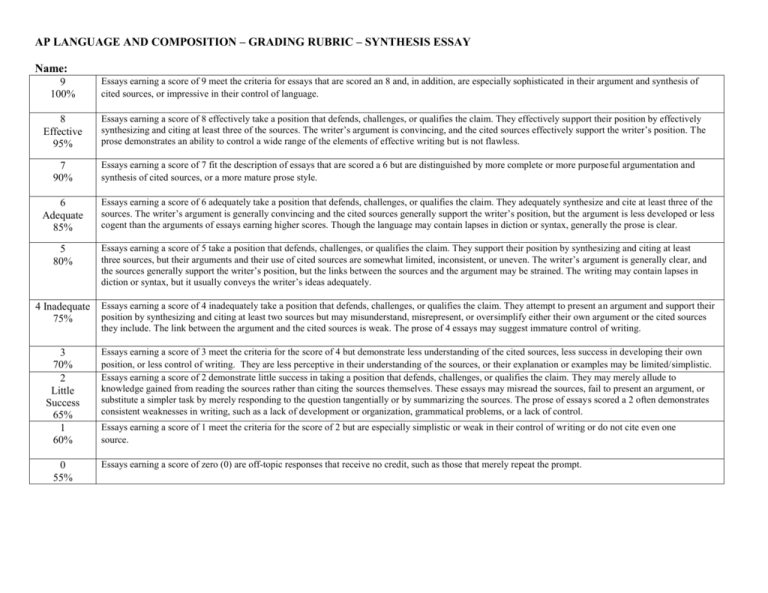
AP LANGUAGE AND COMPOSITION – GRADING RUBRIC – SYNTHESIS ESSAY Name: 9 100% 8 Effective 95% 7 90% 6 Adequate 85% 5 80% Essays earning a score of 9 meet the criteria for essays that are scored an 8 and, in addition, are especially sophisticated in their argument and synthesis of cited sources, or impressive in their control of language. Essays earning a score of 8 effectively take a position that defends, challenges, or qualifies the claim. They effectively support their position by effectively synthesizing and citing at least three of the sources. The writer’s argument is convincing, and the cited sources effectively support the writer’s position. The prose demonstrates an ability to control a wide range of the elements of effective writing but is not flawless. Essays earning a score of 7 fit the description of essays that are scored a 6 but are distinguished by more complete or more purposeful argumentation and synthesis of cited sources, or a more mature prose style. Essays earning a score of 6 adequately take a position that defends, challenges, or qualifies the claim. They adequately synthesize and cite at least three of the sources. The writer’s argument is generally convincing and the cited sources generally support the writer’s position, but the argument is less developed or less cogent than the arguments of essays earning higher scores. Though the language may contain lapses in diction or syntax, generally the prose is clear. Essays earning a score of 5 take a position that defends, challenges, or qualifies the claim. They support their position by synthesizing and citing at least three sources, but their arguments and their use of cited sources are somewhat limited, inconsistent, or uneven. The writer’s argument is generally clear, and the sources generally support the writer’s position, but the links between the sources and the argument may be strained. The writing may contain lapses in diction or syntax, but it usually conveys the writer’s ideas adequately. 4 Inadequate 75% Essays earning a score of 4 inadequately take a position that defends, challenges, or qualifies the claim. They attempt to present an argument and support their position by synthesizing and citing at least two sources but may misunderstand, misrepresent, or oversimplify either their own argument or the cited sources they include. The link between the argument and the cited sources is weak. The prose of 4 essays may suggest immature control of writing. 3 70% 2 Little Success 65% 1 60% Essays earning a score of 3 meet the criteria for the score of 4 but demonstrate less understanding of the cited sources, less success in developing their own position, or less control of writing. They are less perceptive in their understanding of the sources, or their explanation or examples may be limited/simplistic. Essays earning a score of 2 demonstrate little success in taking a position that defends, challenges, or qualifies the claim. They may merely allude to knowledge gained from reading the sources rather than citing the sources themselves. These essays may misread the sources, fail to present an argument, or substitute a simpler task by merely responding to the question tangentially or by summarizing the sources. The prose of essays scored a 2 often demonstrates consistent weaknesses in writing, such as a lack of development or organization, grammatical problems, or a lack of control. 0 55% Essays earning a score of 1 meet the criteria for the score of 2 but are especially simplistic or weak in their control of writing or do not cite even one source. Essays earning a score of zero (0) are off-topic responses that receive no credit, such as those that merely repeat the prompt. AP LANGUAGE AND COMPOSITION – GRADING RUBRIC – RHETORICAL ESSAY Name: 9 100% Essays earning a score of 9 meet the criteria for essays that are scored an 8 and, in addition, are especially sophisticated in their argument and synthesis of cited sources, or impressive in their control of language. 8 Effective 95% High-scoring essays thoroughly address all the tasks of the essay prompt in well-organized responses. The writing demonstrates stylistic sophistication and control over the elements of effective writing, although it is not necessarily faultless. Overall, high-scoring essays present thoroughly developed, intelligent ideas; sound and logical organization; strong evidence; and articulate diction. Rhetorical analysis essays demonstrate significant understanding of the passage, its intent both explicitly and implicitly, and the rhetorical strategies the author employs. 7 90% 6 Adequate 85% Essays earning a score of 7 fit the description of essays that are scored a 6 but are distinguished by more complete explanation, more thorough development, or a more mature prose style. Medium-scoring essays complete the tasks of the essay topic well - they show some insight but usually with less precision and clarity than high-scoring essays. There may be lapses in correct diction or sophisticated language, but the essay is generally well written. Rhetorical analysis essays demonstrate sufficient examination of the author's point and the rhetorical strategies he uses to enhance the central idea. They develop their analysis with evidence and explanations that are appropriate and sufficient, referring to the passage explicitly or implicitly. Essays that earn a medium score complete the essay task, but with no special insights; the analysis lacks depth and merely states the obvious. Frequently, the ideas are predictable and the paragraph development weak. Although the writing conveys the writer's ideas, they are presented simplistically and often contain lapses in diction or syntax. Rhetorical analysis essays demonstrate uneven or insufficient understanding of how rhetorical strategies create an author's point. Often, the writer merely lists what he or she observes in the passage instead of analyzing effect. These essays are weaker than the 5 score because the writer overlooks or perhaps misreads important ideas in the passage. The student may summarize the passage's ideas instead of analyzing them. Although the writer's ideas are generally understandable, the control of language is often immature. Rhetorical analysis essays demonstrate little discussion of rhetorical strategies or incorrect identification and/or analysis of those strategies. Essays earning a score of 3 meet the criteria for the score of 4 but demonstrate less understanding of the cited sources, less success in analyzing the rhetorical strategies used to achieve the purpose. They are less perceptive in their understanding of the passage, or strategies, or the explanations or examples may be particularly limited or simplistic. The essays may show less maturity in control of writing. These essays demonstrate minimal understanding of the topic or the passage. Perhaps unfinished, these essays offer no analysis of the passage and little or no evidence for the student's ideas. Incorrect assertions may be made about the passage. Stylistically, these essays may show consistent grammatical problems, and sentence structure is usually simple and unimaginative. Rhetorical analysis essays demonstrate little ability to identify or analyze rhetorical strategies. Sometimes these essays misread the prompt and replace it with easier tasks, such as paraphrasing the passage or listing some strategies the author uses. 5 80% 4 Inadequate 75% 3 70% 2 Little Success 65% 1 60% 0 55% Essays earning a score of 1 meet the criteria for the score of 2 but are especially simplistic or weak in their control of writing. Essays earning a score of zero (0) are off-topic responses that receive no credit, such as those that merely repeat the prompt. AP LANGUAGE AND COMPOSITION – GRADING RUBRIC – ARGUMENT ESSAY Name: 9 100% Essays earning a score of 9 meet the criteria for essays that are scored an 8 and, in addition, are especially sophisticated in their argument and thorough in their development, or impressive in their control of language. 8 Effective 95% 7 90% 6 Adequate 85% 5 80% 4 Inadequate 75% 3 70% 2 Little Success 65% 1 60% 0 55% Essays earning a score of 8 effectively develop a position on the relationship between certainty and doubt. The evidence and explanations used are appropriate and convincing, and the argument is especially coherent and well developed. The prose demonstrates a consistent ability to control a wide range of the elements of effective writing but is not necessarily flawless. Essays earning a score of 7 fit the description of essays that are scored a 6 but are distinguished by more complete or more purposeful argumentation and synthesis of cited sources, or a more mature prose style. Essays earning a score of 6 adequately develop a position on the relationship between certainty and doubt. The evidence and explanations used are appropriate and sufficient, and the argument is coherent and adequately developed. The writing may contain lapses in diction or syntax, but generally the prose is clear. Essays earning a score of 5 develop a position on the relationship between certainty and doubt. The evidence or explanations used may be uneven, inconsistent, or limited. The writing may contain lapses in diction or syntax, but it usually conveys the student’s ideas. Essays earning a score of 4 inadequately develop a position on the relationship between certainty and doubt. The evidence or explanations used may be inappropriate, insufficient, or less convincing. The argument may have lapses in coherence or be inadequately developed. The prose generally conveys the student’s ideas but may be less consistent in controlling the elements of effective writing. Essays earning a score of 3 meet the criteria for a score of 4 but demonstrate less success in developing a position on the relationship between certainty and doubt. The essays may show less maturity in control of writing. Essays earning a score of 2 demonstrate little success in developing a position on the relationship between certainty and doubt. These essays may misunderstand the prompt or substitute a simpler task by responding to the prompt tangentially with unrelated, inaccurate, or inappropriate explanation. The prose often demonstrates consistent weaknesses in writing, such as grammatical problems, a lack of development or organization, or a lack of coherence and control. Essays earning a score of 1 meet the criteria for a score of 2 but are undeveloped, especially simplistic in their explanation and argument, weak in their control of language, or especially lacking in coherence and development. Essays earning a score of zero (0) are off-topic responses that receive no credit, such as those that merely repeat the prompt.


